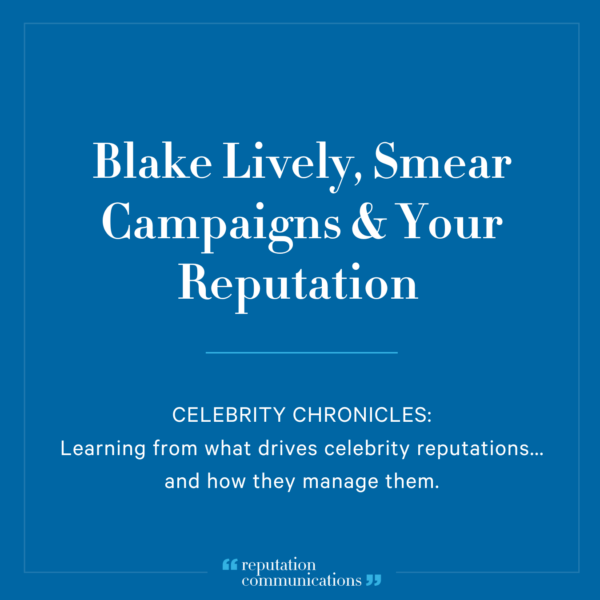
If you’ve followed Hollywood news since the holidays, there’s one story that’s been pretty hard to escape — the bombshell report that actress Blake Lively (one-half of a power couple with movie star Ryan Reynolds) filed a lawsuit against co-star and director Justin Baldoni.
In the lawsuit, Lively accuses Baldoni and his PR team of orchestrating a smear campaign with the purpose of destroying her reputation. This all stems from Lively bringing up concerns of alleged harassment and misconduct on the set of their recent film, “It Ends With Us.”
It caused a media storm, complete with news articles and counter lawsuits from Baldoni. It paints a shocking picture of the tactics some PR and social media consultants will take to smear a person’s reputation. As one hired gun boasted in text messages revealed by Lively’s team, “You know we can bury anyone.”
This isn’t just news that applies to global celebrities. It should matter to you. At Reputation Communications, we have consulted on ways to repair the reputational damage that comes in the wake of aggressive smear campaigns:
• A political smear campaign. Dozens of Twitter posts and social media videos from fake accounts were released online daily with the sole purpose of denigrating a powerful political donor’s reputation.
• A defamation campaign. Fraudulent websites were created to mimic legitimate business sites, spreading harmful misinformation in the process. Fake social accounts published malicious and profane posts falsely attributed to the person who legitimately bore that name.
• Doxxing a high-profile financial industry leader. This individual’s personal address was published online — including satellite photos of their home. Crowds were encouraged to go there and stage public protests. [These types of doxxing campaigns can happen after a company performs a mass layoff, putting the safety of executives, managers and their families at risk].
There are legal remedies here. But, keep in mind, it can take weeks or even months for them to be activated. In that time, malicious actors can continue these destructive smears.
We’ve seen it all.
We’ve consulted with people who have been the victims of baseless lawsuits that have been filed for no reason other than denigrating or punishing an employee. Even after it’s dropped, the filing can persist at the top of a person’s search results online. This poses grave reputational risk. This can prevent the individual from being hired anywhere else. We’ve also worked with someone who, after a promotion, became the subject of continual embarrassing social media posts by someone assuming her identity. There are many examples of this with details too unsavory to delve into here.
Expect more — AI is compounding this situation exponentially.
What you should know
The less online content that you take ownership of yourself, the more your reputation is at risk. No factual material attributed directly to your name that ranks high on Google? Then, there are more opportunities for bad actors to spread misinformation about you.
Content is king.
Articles, blogs, podcasts, websites, press materials, and strategic uses of social media like TikTok and Instagram are opportunities where content that shows the best of you to the world can preserve your reputation. It can also offer a marketing tool for your companies and brand. It’s a win-win.
Online reputational management will push that outdated or undesirable content lower in search results. If you fail to do this, that negative, disparaging information may resurface to the top of Google. This often happens within three to six months. Keep your content current!
Also, make sure your personal data — think home address, phone numbers, personal email addresses — are not readily available publicly. Personal info for you and your loved ones may be on up to 25 search databases like Spokeo and PeekYou. This sensitive information puts your privacy and personal security at risk.
We use privacy protection services like Abine’s DeleteMe as one vital tool. It removes this information for $129 annually. Several similar services are detailed here.
Blake Lively’s case is not over, with countersuits being filed and a range of commentary from crisis and legal experts flooding the airwaves and internet. Consider it a lesson in how smear campaigns can — and do — work…though this case is just one example.

